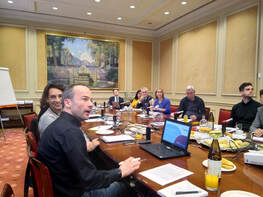The share of Belgium’s total expenditure on international cooperation spent on health and reproductive health has fallen to 11% in 2018, the lowest percentage in 4 years. A downward trend is found over the course of the previous legislative period, from 14% in 2015, 12.7% in 2016 and 12.4% In 2017. The trend is shown in the audit of the 2018 ODA expenditure by DGD, conducted by Sensoa, the Flemish centre of expertise on sexual health, which compared the 2018 expenditure with previous years.
‘How can we explain to young people today that we could not prevent them from becoming infected?'11/12/2019
 World Aids Day Seminar in the Belgian Senate. Copyright Sensoa. World Aids Day Seminar in the Belgian Senate. Copyright Sensoa. For World Aids Day, the ‘Parliamentarians for the 2030 Agenda’ invited UNAIDS Brussels Representative Dr. Jantine Jacobi, Burundian youth representative Fabien Ndikuriyo, Stéphanie Drèze of MSF and Dr. Gert Scheerder of Sensoa to discuss the HIV epidemic worldwide, in Belgium and in Belgium’s partner countries.  MP Georges Dallemagne at a pro-SRHR rally in Manilla. Copyright EPF MP Georges Dallemagne at a pro-SRHR rally in Manilla. Copyright EPF Georges Dallemagne, Belgian MP and member of the Parliamentarians for the 2030 Agenda visited the Philippines and learned about the country's outstanding challenges in living up to the needs of its young population. The Philippines counts as many as 104 million people and is the 13th most populated country in the world. The country has seen an unprecedented growth of its population, in part due to the lack of access to family planning. The Philippines’ ultraconservative catholic church forbade access to contraception and while its influence is said to be slowly lessening, it is still having a huge impact on the family planning decisions of citizens. Only 40% of all young women have access to contraceptives and one in 10 girls has their first child before the age of 10. |

 RSS Feed
RSS Feed